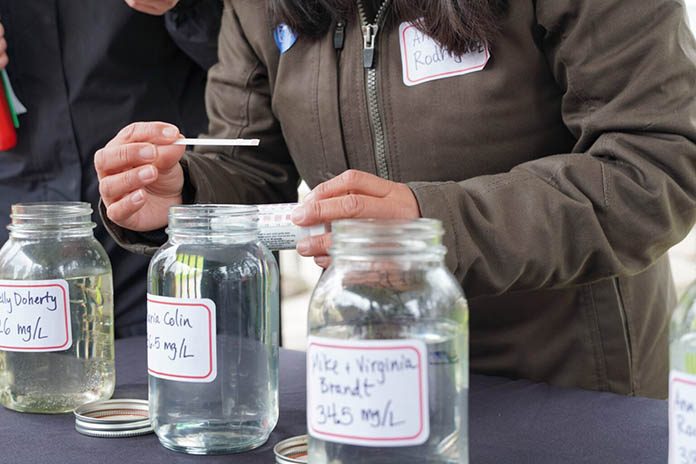
By Lynne Terry/Oregon Capital Chronicle
The water woes are not over for hundreds of households in eastern Oregon.
The Oregon Health Authority has asked about 1,600 households that had their well water tested last year in Morrow and Umatilla counties to take advantage of another round of free testing to recheck the safety of their water. The groundwater in the area – the Lower Umatilla Basin Groundwater Management area – is tainted with harmful nitrates from agricultural manure and fertilizers and industrial waste from the Port of Morrow and food processors in the area.
Toxicity levels can vary over time, which is why the agency wants households to test again. The agency mailed letters in mid-May asking households to retest. In June, state officials sent the results of last year’s test, with a brochure explaining the results and information about how often they should have their well water retested.
High nitrate levels can cause stomach, bladder and intestinal cancers after a long period of exposure, putting hundreds of Oregonians at risk. About 3,300 households in the area rely on well water, and many are low-income Latino families.
After years of pressure from environmental and community groups and local officials, the Oregon Health Authority launched the free testing program last year. To date, state officials have tested the wells of only 1,925 households, according to public data. More than 20% of those tested – about 450 households – had nitrate levels of at least 10 milligrams per liter, which is considered dangerous, especially for babies and those who are pregnant.
Nearly 160 households had levels above 25 milligrams per liter – about 8% of those tested. Those households qualify for the free installation and maintenance of a water-purifying reverse osmosis system, while households with nitrate levels at least 10 milligrams per liter qualify for free water deliveries.
In this round of testing, Bingham said state officials are focusing on retesting households with levels between 5 and 10 milligrams per liter – about 300 – to see whether their water has become unsafe. Officials from the Department of Human Services, which is involved in the program, have picked up tests from nearly 125, while nearly 40 have declined, Bingham said.
Community groups welcomed the retesting program but they said the state is still not doing enough to protect residents. Officials offered free tests to households last year by going door to door three times, and about 500 households declined, said Larry Bingham, a spokesman for the Oregon Health Authority. He told the Capital Chronicle that 900 households remain “unreachable” because they had no trespassing signs or guard dogs.
Kaleb Lay, policy and research director at the nonprofit Oregon Rural Action, said the state needs to get “creative” in contacting households.
“No trespassing signs just come with the territory in rural communities, and most of those three visits were done during work hours on weekdays despite these being working-class communities,” Lay told the Capital Chronicle. “I think it’s a misrepresentation for OHA to call those people ‘unreachable.’”
He said state officials should contact neighbors to see when people get home and visit on weekends or evenings when people are off work.
“There are ways to reach these folks,” Lay said.
The testing program follows years of inaction by the Department of Environmental Quality to crack down on local polluters. Even after the DEQ levied record fines against the Port of Morrow and the port agreed to pay $2 million toward the health authority’s clean water efforts, it continues to pollute.
Local frustrations led to five residents in February filing a lawsuit in U.S. District Court in Pendleton against the Port of Morrow and other industrial polluters, asking that they be ordered to assess the soil and water and clean it up, pay unspecified punitive damages and pay for medical monitoring. That suit is continuing.
In May, 30 groups including Oregon Rural Action asked Gov. Tina Kotek to declare a water emergency in the area. Lay said that would have an immediate effect.
“It would bring some much needed flexibility and urgency to how the state agencies are approaching this,” Lay said. “A formal emergency declaration could also help bring more state resources to the table. And part of why governments declare emergencies for wildfires, hurricanes and other disasters is that it spurs action, both within the government and within the community where the emergency is happening.”
Kotek’s office disputed that. Anca Matica, a Kotek spokeswoman, told the Capital Chronicle in a statement that declaring a state of emergency would not unlock any more resources. She also indicated Kotek would only consider an official request.
“Morrow and Umatilla counties have not requested a declaration of a state emergency from Governor Kotek, which is an important part of the decision whether to do so,” Matica wrote.
All residents in the Lower Umatilla Basin Groundwater Management area qualify for free well water testing. To get one, go to testmywell.oregon.gov, email Domestic.Wells@odhsoha.oregon.gov or call 541-952-9254.
Oregon Department of Human Services officials will call to schedule a time to pick up a water sample from the property and deliver it to the Oregon Health Authority’s lab for analysis.
This story first appeared in the Oregon Capital Chronicle.










